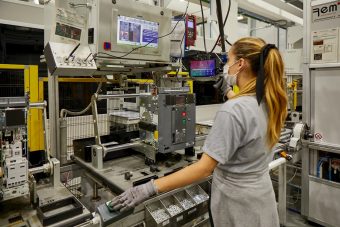
Zero production waste to landfill has been achieved at ABB Smart Power’s manufacturing unit in Frosinone, Italy — 14 years ahead of the European Union’s Circular Economy Package target of no more than 10 percent landfilling by 2035.
Driven by rapid urbanization and growing populations, global annual waste generation is expected to jump to 3.4 billion tons over the next 30 years, up from two billion tons in 2016. Some 37 percent of this global waste is disposed of in a landfill.
Landfills, long the default for waste removal across the world, are considered unsustainable. Space is running out and landfilling contributes to climate change through the high levels of methane and carbon dioxide generated by rotting rubbish that could otherwise be re-used.
Opened in 1969, ABB’s Frosinone factory represents a center of excellence in ABB for the development and manufacture of low-voltage circuit breakers. The 150,000 square-meter facility with 800 employees is highly automated and produces more than three million circuit breakers every year. A Lighthouse Plant, selected by the Italian government as a model for digital transformation and Industry 4.0 strategies, Frosinone promotes smart, digitalized, and connected operations, increasing efficiency across the full value chain. Achieving zero production waste to landfill was a whole-factory program.
More:
ABB is steadily reducing its environmental footprint through waste reduction and recycling programs at its sites around the world, building on the 27 percent reduction in overall waste achieved over the 2013–2020 period. “Preserving resources is a key pillar of ABB’s Sustainability 2030 strategy, with zero waste to landfill – wherever local conditions allow – an explicit target,” said Theodor Swedjemark, Chief Communications and Sustainability Officer, ABB. “The benchmark on zero production waste achieved at ABB’s Frosinone facility serves as a testament to fast, tangible progress on that strategy and on more circular operations, moving past the unsustainable ‘take, make, dispose’ model of production.”
Giampiero Frisio, President Smart Power Division, said: “We have proven at our Frosinone plant that with the right attitude and commitment from everyone across the business, zero waste to landfill is achievable. Since announcing our zero waste ambitions in 2017, this latest milestone signifies how we are leading positive change across our full production chain, delivering more sustainable solutions for all our stakeholders.”
Staff training was critical in educating, empowering and building the right attitude and culture for the zero-production waste to landfill initiative. Training topics included managing waste in accordance with current environmental legislation and the importance of waste separation. By getting the teams engaged, handling personnel became more involved in the correct management of the waste area.
Waste sorting and identification is set up at the place where waste originates. There are about 150 different labeled production waste containers and separated paper-cardboard and plastic waste containers in each workstation. The same amount of waste is coded as before, but with higher degrees of separation comes a higher percentage of waste recovery.
ABB Smart Power’s manufacturing unit in Frosinone is exploring more sustainable practices such as reduced CO2 emissions by optimizing processes across the entire supply chain, a circular manufacturing process, reducing transportation and increasing plastics recovery.
Source: ABB



